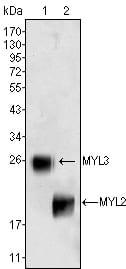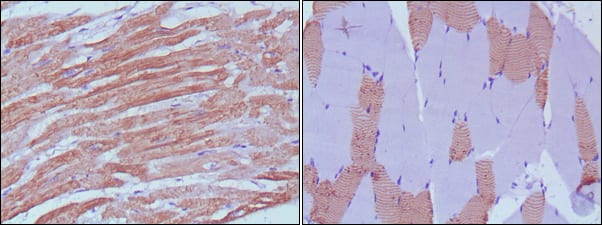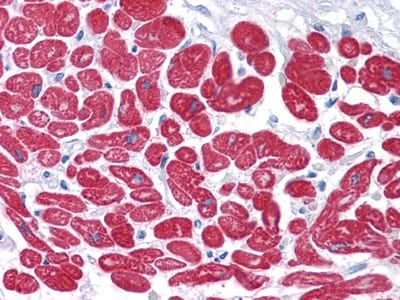


| WB | 1/500 - 1/2000 | Human,Mouse,Rat |
| IF | 咨询技术 | Human,Mouse,Rat |
| IHC | 1/200 - 1/1000 | Human,Mouse,Rat |
| ICC | 技术咨询 | Human,Mouse,Rat |
| FCM | 咨询技术 | Human,Mouse,Rat |
| Elisa | 1/10000 | Human,Mouse,Rat |
| Aliases | CMH8; VLC1; MLC1V; MLC1SB |
| Entrez GeneID | 4634 |
| clone | 7C1 |
| WB Predicted band size | 22kDa |
| Host/Isotype | Mouse IgG1 |
| Antibody Type | Primary antibody |
| Storage | Store at 4°C short term. Aliquot and store at -20°C long term. Avoid freeze/thaw cycles. |
| Species Reactivity | Human |
| Immunogen | Purified recombinant fragment of MYL3 expressed in E. Coli. |
| Formulation | Purified antibody in PBS with 0.05% sodium azide. |
+ +
以下是关于MYL3抗体的3篇参考文献的简要信息,涵盖其在不同研究中的应用:
---
1. **文献名称**:*MYL3 mutations and cardiac phenotype in hypertrophic cardiomyopathy*
**作者**:Geier, C., et al.
**摘要**:该研究分析了肥厚型心肌病(HCM)患者的MYL3基因突变,并利用MYL3抗体通过免疫印迹和免疫组化检测突变对心肌肌球蛋白轻链表达的影响,揭示了突变导致蛋白稳定性下降与疾病表型的关联。
---
2. **文献名称**:*Structural characterization of cardiac myosin light chain-3 using specific monoclonal antibodies*
**作者**:Satoh, A., et al.
**摘要**:本研究开发了针对MYL3蛋白的单克隆抗体,通过表位定位和晶体学分析验证其特异性,证实该抗体可用于心肌组织中的MYL3蛋白定位及功能研究,为后续病理机制探索提供了工具。
---
3. **文献名称**:*Ablation of ventricular myosin light chain 3 disrupts sarcomere stability and cardiac function*
**作者**:Yang, Q., et al.
**摘要**:通过构建MYL3基因敲除小鼠模型,结合MYL3抗体的免疫荧光和Western blot分析,研究发现MYL3缺失导致肌节结构紊乱和心功能异常,强调了其在维持心肌收缩中的关键作用。
---
**备注**:若需获取全文或更多文献,建议通过PubMed、Web of Science等平台以“MYL3 antibody”或“myosin light chain 3 antibody”为关键词进一步检索。
The MYL3 antibody targets myosin light chain 3 (MYL3), a protein encoded by the MYL3 gene in humans. MYL3 belongs to the regulatory light chain family of myosin-associated proteins, primarily expressed in cardiac and skeletal muscle tissues. It plays a critical role in muscle contraction by modulating the ATPase activity of myosin heavy chains, thereby influencing the force and kinetics of actomyosin interactions. MYL3 is particularly abundant in slow-twitch skeletal muscle fibers and ventricular cardiomyocytes, where it contributes to maintaining structural integrity and contractile function.
Antibodies against MYL3 are widely used in research to study its expression, localization, and interaction partners in muscle cells. They are essential tools for applications like Western blotting, immunohistochemistry, and immunofluorescence to investigate MYL3's role in physiological and pathological contexts. Mutations in MYL3 have been linked to familial hypertrophic cardiomyopathy (HCM), a genetic disorder characterized by ventricular hypertrophy, arrhythmias, and heart failure. MYL3 antibodies thus aid in diagnosing and understanding the molecular mechanisms underlying such conditions. Additionally, these antibodies are employed in studies exploring muscle development, regeneration, and diseases like muscular dystrophy. Their specificity and reliability make them valuable for both basic research and clinical diagnostics.
×